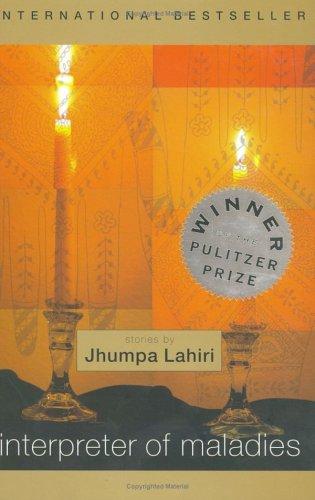Ashwin reviewed Interpreter of Maladies by Jhumpa Lahiri
Review of 'Interpreter of Maladies' on 'Goodreads'
3 stars
(Crossposted from my blog: daariga.wordpress.com/2013/10/06/interpreter-of-maladies/)
I like to read a book, uninterrupted, over a period of a day or two. So, it is sad that I rarely get that kind of time these days. Seeing my friends going bonkers over Jhumpa Lahiri’s latest book, The Lowland, I checked out her bibliography. I am not a total stranger to Lahiri. A few years earlier I had gifted her book, The Namesake, to a friend, after having enjoyed its movie adaptation.
I picked up Interpreter of Maladies, her first major work, after seeing that it was a collection of nine short stories. Surely it would be easier to finish each story without disruptions. All of the stories are based on Bengalis in South Asia or Bengali immigrants to USA. And more than half the stories take place in university towns with the protagonists being or related to PhD students, researchers …
(Crossposted from my blog: daariga.wordpress.com/2013/10/06/interpreter-of-maladies/)
I like to read a book, uninterrupted, over a period of a day or two. So, it is sad that I rarely get that kind of time these days. Seeing my friends going bonkers over Jhumpa Lahiri’s latest book, The Lowland, I checked out her bibliography. I am not a total stranger to Lahiri. A few years earlier I had gifted her book, The Namesake, to a friend, after having enjoyed its movie adaptation.
I picked up Interpreter of Maladies, her first major work, after seeing that it was a collection of nine short stories. Surely it would be easier to finish each story without disruptions. All of the stories are based on Bengalis in South Asia or Bengali immigrants to USA. And more than half the stories take place in university towns with the protagonists being or related to PhD students, researchers or professors.
A daily evening powercut helps a couple in a failing marriage to discover new facets of each other in A Temporary Matter. I loved the characters here and the predicaments of a husband in a long-drawn PhD hit home. Bangladesh’s bloody creation and cultural similarities of South Asians are the subject of When Mr. Pirzada Came to Dine. It features a Bengali researcher from Dhaka who is hosted to regular dinners by a Bengali Indian couple at their home at an US university town. Despite their different nationalities, the fate of a country far away binds the daily emotions of these characters.
In Interpreter of Maladies, a part-time car driver’s full-time job as a Gujarati interpreter to a doctor brings him closer to a member of an American-born Indian family visiting Konark. This story is full of filmy little gems, though most are predictable. A Real Durwan is a tale of cruel fate which befalls an old maid in Calcutta working the flats in a decrepit building. The story has all the familiar plot and characters tricks of RK Narayan, but in a Bengali setting. The pathetic life of Boori Ma and the unhappy ending left me melancholic.
A New York woman ends up being a temporary mistress of an Indian investment banker in Sexy. Despite not being able to rely much on Indian culture in this story, Lahiri’s yarn still has a nice bittersweet taste. One of my favorites from the book is Mrs. Sen’s, where an American kid is daily witness to the afternoon chores of his Indian babysitter woman at her home. Lahiri hits it out of the field when bringing an outsider’s prism over the kitchen duties and marital miffs of a traditional Indian woman. The discovery of Christian symbols in their new house starts to drive a wedge between a newly married guy and his wife in This Blessed House. I found the rocky start of a relationship to be genuine and familiar and the scenarios are actually quite funny.
The Treatment of Bibi Haldar is another story with a strong RKN taste. Set in a Bengali town, Bibi ails from an unknown untreatable ailment that burdens those who look after her. Though the setting is sad, the story has many fun moments around her dreams for a happy married life. The Third and Final Continent ends the book with an intersection of a Bengali with his 103-year landlady near MIT. The dreary predicament of the hero in a cold foreign land reminded me strongly of the second act in The Hills of Angheri.
I found the Interpreter of Maladies to be a quick read. It took a day, even though I stopped to savor many a line in the stories. Being short stories, it is also easier to finish each one in a separate setting. Lahiri’s world is strictly restricted to Bengalis and Bengali immigrants and set in a time before cable TV and internet. The settings gets a bit too familiar by the end. it is however her detailed descriptions of Indian kitchen and family life that never gets old. In many of the stories here it is easy to pick out the threads that lead to her later work, The Namesake. Interpreter of Maladies is a box of treats, sweet, spicy and bitter. Try it!

